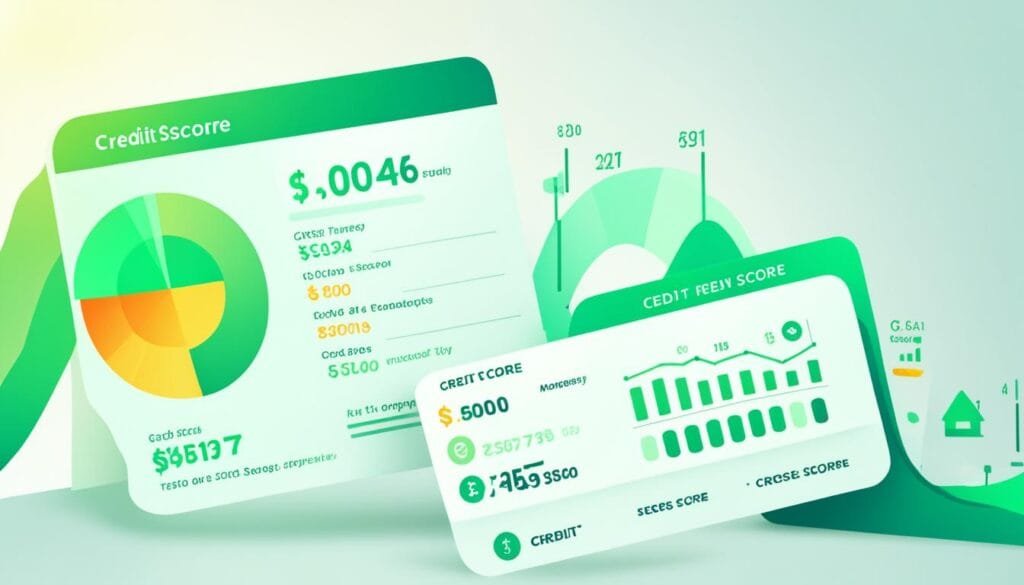Imagine this scenario: Alex, a recent college graduate, has just received their first credit card. Excited about the possibilities, Alex starts using the card for everyday expenses, unaware of the potential consequences. Over time, the balances begin to stack up, and before they know it, Alex finds themselves struggling to make the minimum payments each month. The once-exciting credit card has now become a source of stress and financial burden.
This cautionary tale emphasizes the importance of responsible credit card usage. Credit cards can be valuable tools for building credit responsibly and managing expenses wisely, but without proper knowledge and discipline, they can lead to financial difficulties.
In this article, we will explore key tips for mastering responsible credit usage. From credit card management to responsible borrowing, we will provide you with essential insights and strategies to help you navigate the world of credit successfully. Whether you are a credit card novice or looking to improve your credit habits, this article will equip you with the knowledge you need to make informed decisions and achieve financial stability.
Key Takeaways:
- Spending within one’s means is crucial to avoid unmanageable debt.
- Paying off credit card balances in full and on time establishes good credit and reliability.
- Keeping credit utilization between 20-30% and overall debt-to-income ratio in check safeguards financial stability.
- Using personal loans strategically can help settle high-interest credit card bills.
- Maximizing credit card rewards and benefits requires understanding and wise usage.
Benefits of Responsible Credit Card Usage
Responsible credit card usage offers various benefits for consumers. Credit cards provide functionality, convenience, and security in modern-day transactions. Understanding credit card benefits, such as cashback, points, and perks, allows consumers to maximize their rewards. By matching purchases with the best rewards, consumers can make the most of their credit cards. Choosing a credit card that aligns with one’s lifestyle, like travel rewards for frequent travelers or cashback for everyday spending, enhances the benefits. Using credit card rewards wisely by saving up points, taking advantage of limited-time deals, or using rewards for specific purposes maximizes their value. It’s crucial to be cautious with flashy milestone rewards that can lead to high interest charges if the credit card balance is not paid in full. Responsible credit card usage helps consumers enjoy the benefits and perks offered by credit cards while staying financially empowered.
Managing Credit Utilization for Financial Health
Credit card utilization, also known as the credit utilization ratio, refers to the percentage of available credit that is currently being used. This ratio is a significant factor in determining an individual’s credit score, accounting for approximately 30% of the overall score.
High credit utilization is often viewed as a risk by lenders, as it indicates a higher likelihood of facing difficulties in repaying debts. On the other hand, maintaining low credit utilization demonstrates responsible credit management and can have a positive impact on one’s credit score.
It’s important to note that credit utilization is a dynamic metric that can fluctuate as balances and credit limits change. As a result, it has the potential to quickly influence a person’s credit score.
To effectively manage credit utilization, it is advisable to keep credit card balances low and make frequent payments to reduce outstanding balances. Additionally, avoiding the closure of old credit cards can help maintain a higher overall available credit limit.
If necessary, requesting credit limit increases can also help improve credit utilization rates. Regularly monitoring credit scores is essential for understanding the impact of credit utilization and taking the necessary actions to maintain a healthy credit profile.
Proper management of credit utilization plays a crucial role in maintaining a good credit score and overall financial health. By keeping credit utilization low and actively monitoring this metric, individuals can enhance their chances of obtaining favorable loan terms, credit card approvals, and better interest rates.
Essential Credit Tips for Responsible Borrowing
Responsible borrowing begins with a solid understanding of credit and the key factors that influence it. By following essential credit tips, you can effectively manage your credit and set yourself up for financial success.
- Know Your Credit: Start by familiarizing yourself with your credit score and the factors that impact it. This knowledge will empower you to make informed decisions and take the necessary steps to improve your creditworthiness.
- Create a Budget: Budgeting is crucial for proper financial planning. Allocate funds for different expense categories, including debt repayment, to ensure timely bill payments and avoid unnecessary fees and interest charges.
- Manage Credit Utilization: Keep your credit utilization ratio below 30% to demonstrate responsible credit management. This involves using credit wisely and keeping balances low to maintain a positive credit history and boost your credit score.
- Diversify Your Credit Mix: Having a healthy mix of different types of credit, such as credit cards, loans, and mortgages, can positively impact your credit score. However, it’s important to open new credit accounts cautiously to avoid negatively affecting your credit score.
- Review Your Credit Report: Regularly review your credit report to identify any inaccuracies or fraudulent activities. Addressing these issues promptly helps maintain the integrity of your credit and prevents potential setbacks.
- Understand Terms and Conditions: Before opening new credit accounts or taking out loans, thoroughly read and understand the terms and conditions. This ensures that you are aware of the interest rates, fees, and other important details that can impact your finances.
- Build an Emergency Fund: Creating an emergency fund provides a safety net during unexpected expenses and reduces reliance on credit. Aim to save three to six months’ worth of living expenses to safeguard your financial stability.
- Seek Professional Advice: If you need assistance with debt management or improving your credit, don’t hesitate to seek advice from credit counselors or financial experts. Their expertise can provide valuable guidance tailored to your specific situation.
Quote: “Responsible borrowing begins with a solid understanding of credit and the key factors that influence it.”
By following these essential credit tips, you can navigate the world of credit responsibly and achieve your financial goals. Remember, responsible borrowing is key to building a strong credit history and securing a prosperous financial future.
| Tips for Responsible Borrowing | Description |
|---|---|
| Know Your Credit | Familiarize yourself with your credit score and the factors that impact it. |
| Create a Budget | Allocate funds for different expenses, including debt repayment. |
| Manage Credit Utilization | Keep your credit utilization ratio below 30% to demonstrate responsible credit management. |
| Diversify Your Credit Mix | Maintain a healthy mix of various types of credit. |
| Review Your Credit Report | Regularly review your credit report for accuracy and address any issues promptly. |
| Understand Terms and Conditions | Thoroughly read and understand the terms and conditions before opening new credit accounts or taking out loans. |
| Build an Emergency Fund | Create a financial safety net to cover unexpected expenses. |
| Seek Professional Advice | Consult credit counselors or financial experts for personalized guidance. |
Implement these credit tips into your financial routine to ensure responsible borrowing and a secure financial future.

How Can Responsible Credit Usage Help in Correcting Credit Report Mistakes?
Responsible credit usage can play a critical role in helping to correct credit report mistakes. By consistently managing credit responsibly, individuals can demonstrate reliability to potential creditors and improve their credit score over time. This can ultimately help to correct credit report mistakes and improve overall credit health.
Conclusion
Mastering responsible credit usage is vital for achieving financial stability and attaining desired financial goals. By following key principles such as spending within one’s means, paying balances in full and on time, and keeping credit utilization in check, individuals can navigate the world of credit cards with confidence.
Maximizing the benefits and rewards offered by credit cards adds value to responsible credit card usage. Understanding the rewards offered, choosing the right card for one’s lifestyle, and using rewards wisely can enhance the overall credit card experience.
Managing high credit card balances requires a strategic approach, such as creating detailed budgets, reducing unnecessary expenses, and considering lower-cost personal loans. These loans can help pay off high-interest credit card balances and simplify the journey towards debt repayment.
To ensure responsible borrowing and financial success, it is crucial to comprehend the ins and outs of credit. By following essential credit tips such as understanding credit scores, budgeting effectively, making timely bill payments, diversifying credit mix, and reviewing credit reports regularly, individuals can make informed financial decisions.
By combining responsible credit usage with knowledge and discipline, individuals can take control of their credit and work towards a secure and prosperous financial future.
FAQ
What are the key tips for mastering responsible credit usage?
The key tips for mastering responsible credit usage include spending within one’s means, paying the balance in full and on time, and keeping credit utilization in check.
What are the benefits of responsible credit card usage?
Responsible credit card usage offers various benefits, including functionality, convenience, and security in transactions. Additionally, it allows consumers to maximize credit card rewards and perks.
How does credit utilization affect financial health?
Credit utilization, or the credit utilization ratio, is a major component of a credit score. High credit utilization is viewed as a risk, while low credit utilization demonstrates responsible credit management and helps maintain a good credit score.
What are some essential credit tips for responsible borrowing?
Essential credit tips for responsible borrowing include understanding credit, creating a budget, paying bills on time, managing credit utilization, diversifying credit mix, reviewing credit reports, being cautious when opening new credit accounts, understanding terms and conditions, creating an emergency fund, and seeking professional advice.
Why is responsible credit usage important for financial stability?
Responsible credit usage is important for financial stability as it helps individuals effectively manage their credit, maintain a good credit score, and work towards a secure and prosperous financial future.
Source Links
- https://www.linkedin.com/pulse/mastering-your-finances-essential-credit-tips-success-singleton–aptpc
- https://medium.com/kasheesh/mastering-credit-utilization-the-key-to-a-strong-credit-score-f72da83ca704
- https://bfsi.economictimes.indiatimes.com/blog/mastering-credit-card-usage-effective-strategies-for-responsible-repayment/103082067

